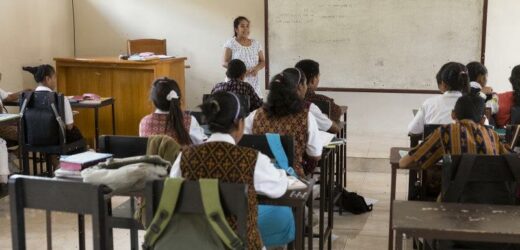Singapore/Jakarta: In Kupang, in Indonesian West Timor, the first school bell of the day is now sounding far earlier than in the rest of the country.
It’s ringing, in fact, when it is pitch-black outside and many children are still asleep.
Students attend class in the city of Ende in East Nusa Tenggara.Credit:Getty Images
Under a new policy brought in this week by Viktor Laiskodat, governor of southern East Nusa Tenggara, public high school students in the provincial capital are walking into classrooms at 5am.
“[Students] can sleep at 10pm and wake up at 4am. Six hours of sleep is enough,” he said in an address to school principals and education officials.
“Bathe for 30 minutes, travel to school for 30 minutes because nowhere is far in this city. So they can be at school by 5am.”
The school day in Indonesia usually starts about 7am and finishes mid-afternoon, depending on the education institution.
But in predominantly Catholic East Nusa Tenggara, a region that takes in the islands of Flores and Sumba, as well as West Timor, that’s not early enough for the governor, a former lawyer and MP.
“The main reason for this is to build our students’ character so they know discipline,” he said.
Laiskodat, who wants to extend the new hours beyond Kupang and across the province after the pilot program in its administrative centre, said only senior high school students, who aged 17 and 18, that would be subject to the changed timetable and not those in junior high.
The decision to have class begin before dawn, though, has been met with criticism from Catholic education leaders and the Indonesian Teachers’ Union Federation, which said it had canvassed the views of parents and teachers.
Viktor Laiskodat has been governor of East Nusa Tenggara province since 2018.Credit:Jewel Topsfield
“It turns out that many parents disagree with this policy, the responses vary from the safety factor of the child when going to school, difficult transportation in the morning, and the readiness of parents at home such as providing breakfast, and various considerations for children’s health,” said Retno Listyarti, chair of the teachers’ federation expert body.
She pointed to learning development being affected by students due to lack of sleep.
“Sleep is very important for the body. During sleep, the body will repair itself, both physically and mentally, so that we feel refreshed and energised when we wake up and are ready for activities. This is important and necessary for children who are growing up to the age of 18,” she said.
The government has justified the policy by comparing it to the early starts of Islamic boarding schools, whose students rise for the call to prayer at dawn. It also equated the timing to the hours worked by vendors in markets who often begin work at 3am.
With many students making their own way to school, provincial ombudsman Darius Beda Daton, however, has also urged the governor to reconsider the new policy for safety reasons.
Students play outside at a school in Kupang, West Timor.Credit:Getty Images
“[Parents’] objections are that this policy has not been largely explained to schools and parents and students,” he told The Sydney Morning Herald and The Age on Wednesday.
“If they have to be at school by 5am, it means they have to wake up by 4am and parents should make preparations by 3am. Another point is there is no public transport available in Kupang by 4.30am. Security is the issue too for the children if they are in the streets that early.
“We have given suggestions to the provincial education office that this policy must be comprehensively assessed by inviting all education stakeholders and discuss it with school committees, the police and transportation office must also be involved in the discussion.”
At the schools in Kupang where students have arrived before dawn since Monday, it has been a challenging transition.
One senior student said classes hadn’t actually started until 6am, instead they had done marching exercises and been addressed by the principal until then.
“Usually I wake up around 5.30am but now I have to wake up at 4am. It’s difficult,” the student said.
“[The principal] said it made us more effective in learning, the brain is in better quality in the morning to accept school subjects, to learn more disciplines. Most of [my family] oppose the policy. They think if it is to improve discipline, we can still implement the 7am school time and improve all the programs.”
Marselinus Tika, a chemistry teacher at SMAN 6 school in Kupang, one of those in the pilot program, would also prefer a later start because he and his wife, who also works, have two children, aged seven and three.
He said teachers were worried about students walking to school in the early hours of the morning and were hoping buses would be provided but he could also see the governor’s point of view.
“Waking up early is probably better for children than letting them staying up late just playing games,” he said. “So maybe this policy has a positive side.”
Get a note directly from our foreign correspondents on what’s making headlines around the world. Sign up for the weekly What in the World newsletter here.
Most Viewed in World
From our partners
Source: Read Full Article





